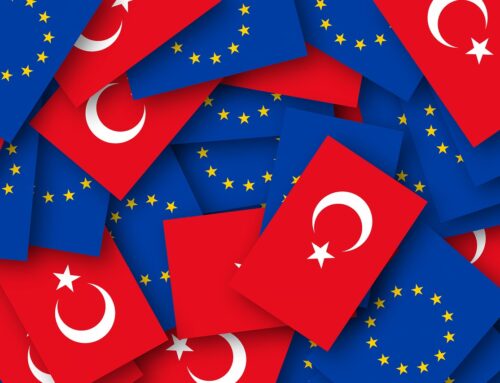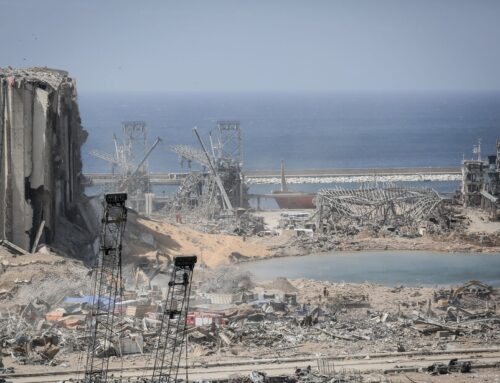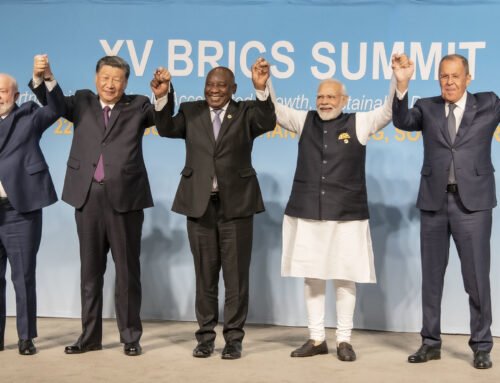PULASKI POLICY PAPER: T.Otłowski – Geopolitics of the COVID-19 Pandemic
Autor foto: Domena publiczna

Geopolitics of the COVID-19 Pandemic
July 1, 2020
Author: Tomasz Otłowski




PULASKI POLICY PAPER: T.Otłowski – Geopolitics of the COVID-19 Pandemic
Autor foto: Domena publiczna
Geopolitics of the COVID-19 Pandemic
Author: Tomasz Otłowski
Published: July 1, 2020
Pulaski Policy Paper No 6, 2020. July 1, 2020
In the aftermath of the unexpected COVID-19 outbreak, the world has been plunged into a deep socio-economic crisis and chaos comparable with the Great Depression or the First and the Second World War. The coronavirus pandemic will definitely affect the course of history, reshape the global economy and bring revolutionary changes to international relations.
The COVID-19 pandemic is expected to severely affect the global economy in the short run. Unlike the 2008-2009 global financial crisis, the pandemic has undermined economic foundations of most states, particularly the manufacturing sector and trade in goods and services. Government restrictions disrupted the mining industry and resulted in shutting down factories and service providers. The pandemic has also caused an unprecedented fall in global trade and led to strict travel restrictions that paralysed various sectors across the world, including the tourism industry, which is an essential source of national income for a number of countries. Furthermore, the introduction of strict lockdown rules brought disruption to movement of goods and caused supply chains shortages at national and global levels. The rapid spread of the disease and the policies implemented to tackle the pandemic have shaken the foundations of states and societies. Therefore, the far-reaching political repercussions of the pandemic seem to be even more important than its economic consequences.
Although the pandemic is likely to have a multidimensional geopolitical impact in the long run, some of its implications are already observable:
- The marginalisation of international organisations and growing importance of state as a fundamental socio-political organisation and an actor in international politics;
- The declining strategic role of Europe and the European Union;
- The crisis of the US role as an undisputed superpower;
- The rise of China as a regional power with global aspirations that contests the existing international order;
- Growing instabilities in international relations caused by the attempts of regional powers to strengthen their influence in the realm of foreign affairs in the covid-19 era.
The fragility of international organisations
International organisations have been plagued by inefficiency since the beginning of the pandemic; however, it is unsurprising that the international organisations adopted a passive stance given that their role has been declining for a long time. Even though there is a plethora of reasons for this state of affairs, it is worth noting that the pandemic has accelerated this process. The current situation comes as a warning that the contemporary model of international relations based on intergovernmental bodies is facing a severe crisis. The COVID-19 pandemic has proven that the United Nations with its specialised agencies – as well as other regional and international arrangements – are neither competent nor efficient to deal with the scale, range, and the rate of COVID-19 transmission. The lack of efficiency was particularly visible in the first phase of the pandemic in February and March 2020 when the situation required immediate political decisions. Most international bodies responsible for tackling the pandemic and its impact turned out to be devoid of political will or determination, and practically incapable of making any major efforts to combat the COVID-19 outbreak. For instance, despite that the World Health Organisation (WHO) has tools and capabilities to prevent the spread of the virus; the organisation was paralysed by actions of its own members and the political calculation behind the decision-making process. Moreover, the WHO was impaired by the dispute between Beijing and Washington which has led the United States to halt funding to the World Health Organisation.
Given the internal weaknesses and insufficient response of international and supranational bodies, the states had to shoulder responsibility for tackling the pandemic and its economic repercussions. It turned out that only strong and well-governed countries – especially unitary states – are able to face the pandemic-related challenges and that nothing can replace a nation-state in this task. The growing importance of state institutions have other long-term implications including granting additional powers to government agencies to prevent the spread of the pandemic and to combat its impact, but at the cost of extending the state’s control over citizens.
The demise of Europe’s power
A paradigm shift in governance is especially obvious in Europe where some part of the political elite has been striving to turn the European Union into a superstate since the early 2000s. The pandemic, however, has provided ample evidence that the vision of united Europe will not materialise in the foreseeable future. The bureaucratic machine of the European Union and its entire leadership were caught off guard when the grave health and socio-economic crisis struck the old continent. The response of the EU institutions was too sluggish and the community lacked a coherent strategy to deal with the pandemic. As an intergovernmental organisation, the EU failed the crisis management exam by being unable to effectively react to the COVID-19 crisis and protect its members and citizens. Nevertheless, incoherent approach to the pandemic, poor crisis management skills of European policy makers and the EU’s bloated and ineffective bureaucracy are only the tip of the iceberg. It was truly shocking to observe alienation of the EU states that were hit by the pandemic; instead of supporting its members, the European Union displayed neither the solidarity nor the community spirit. In addition, the large EU member states prioritised their own national interests above the community’s interests; for instance, during the peak of the pandemic in March 2020, Italy’s request for medical supplies met with a refusal from German and French authorities. Not only did the EU fail to help its own members, but it also overlooked the needs of its neighbours, e.g. the Western Balkans, Belarus, and Ukraine. The aforementioned situation can be perceived as another argument that the community is facing a severe crisis in its current organisational form. Therefore, the EU leadership ought to discuss the future goals and priorities of the community once the pandemic is over. Possibly, the model of European integration based on the concept of the union of sovereign states will find more support in Western Europe. If it does not happen, the European Union will become one of the greatest geopolitical losers of the pandemic, which will eventually undermine the strategic importance of the EU. Even though this process began several decades ago, the pandemic seems to accelerate this trend. The governments of EU member states need to reshape their politics unless they are keen to fade into geopolitical oblivion.
The US hegemony in crisis
After six months of the pandemic it is clear that United States is among the countries that faced the most severe political, health and socio-economic consequences of the COVID-19. The mistakes made by the federal and state administration – including practically no prevention when the virus started spreading across the country – will bring about high death toll and significant economic losses. Undoubtedly, the negative implications of the pandemic will be aggravated by an unprecedented socio-political crisis and racial tensions. As a result, the internal and international position of the United States has been undermined by the accumulated consequences of the pandemic. Nevertheless, the full scale of social and economic implications of the COVID-19 will be known over the coming months.
The geopolitical conditions of the US were also affected by the fact that the pandemic diminished the US military capability and the power projection. Although these issues were rather temporary, they did not remain unnoticed by the rivals and enemies of the US. Due to the COVID-19 pandemic, the US Department of Defence was forced to cancel or postpone most military exercises, and halt the movement of US forces across the world for 60 days (from mid-March to mid-May 2020). Furthermore, the rapid spread of the disease affected entire military garrisons or crews of naval vessels; this situation has become another symbol of Washington’s strategic challenges. The gloomy picture of the state of American nation has been strengthened by the deployment of the National Guard troops to stop the riots in May 2020 and by Donald Trump himself who threatened to use regular armed forces to deal with rioters. The aforementioned events coincided with a decline of US foreign policy and limited diplomatic and military activity, especially in the areas that are in the midst of a security crisis, e.g. Libya, Iraq, and Syria. All these factors contribute to the image of the United States as an ineffective superpower, which is unable to control the internal situation and implement its foreign policy. Furthermore, since March 2020, the current US administration has been implying that Washington is going to take an isolationist stance, for instance, by pushing the peace talks with the Taliban; announcing the withdrawal of the US troops from Iraq and Germany; and by reducing the US involvement in Libya. Trump’s speech at West Point Graduation Ceremony on June 13 clearly indicated that the United States would no longer be involved in ‘endless wars’ and serve as a global policeman. Undoubtedly, the pandemic has had a significant impact on the US internal affairs and therefore Trump decided to refresh his ‘America First’ slogan that had helped him win the 2016 election.
The awakening of the Chinese dragon
It seems obvious that the US stance will meet with loud applause in Beijing and the capitals of other regional powers with global political aspirations. Certainly, the People’s Republic of China is rising as the greatest geopolitical winner of the pandemic, which is a curious paradox given that the covid-19 pandemic began in PRC and then spread across the world. Despite the initial challenges, Beijing managed to control the disease and reduced the range and scale of socio-economic losses, which turned out to be insignificant compared to the state of affairs in Europe, the United States, or South America. Having implemented draconian measures of the state’s police apparatus, the Chinese government retained an advantageous position that can be effectively used for political, business and propaganda purposes as an efficient tool of China’s soft power strategy. Beijing has positioned itself as a state able to deal with the pandemic and that can support other countries in their struggle against the disease. The main targets of the ‘coronavirus diplomacy’ are non-democratic regimes that cannot rely on support of the West due to human rights violation and ideological differences. Beijing is using this tactic to strengthen its position in Africa, Middle East, Asia, as well as in the Western Balkans to crowd out western influence in the region.
In April 2020, Beijing initiated a new diplomatic, propaganda, and military offensive on an unprecedented scale in order to undermine China’s regional and global rivals and to capitalize on the ongoing pandemic. For instance, the Chinese government put an end to the remnants of Hong Kong’s autonomy and continues to exert considerable pressure on the states located in the South China Sea region by establishing a fait accompli. The People’s Liberation Army has become more active in East and Southeast Asia and there is no denying that the actions of the Chinese government are deliberatively provocative towards China’s neighbours and competitors such as Taiwan, Japan, Vietnam, Philippines. The Chinese government began to test India’ patience in the Karakoram mountains and pursues an aggressive stance in Indochina and Western Pacific against the United States. Beijing has also accelerated the construction of large naval bases in Gwadar, Pakistan and Doraleh, Djibouti. In April, the US Department of State announced that China had conducted a low-level nuclear test and continues developing its nuclear arsenal. There is no doubt that China is keen to capitalise on the pandemic to reach its strategic goals. Certainly, the new foreign policy of Beijing will become more assertive and aggressive not only in terms of China’s diplomatic efforts but also in the economic dimension, e.g. by conducting acquisitions of western companies that are on the verge of bankruptcy.
The post-pandemic world and the ultimate end of the era of global stability
China is not the only state that wants to gain ground during the COVID-19 pandemic; other regional powers – such as Russia, India, Pakistan, Iran, Turkey, Saudi Arabia, and Brazil – seem to follow the same path. Despite the fact that the aforementioned countries have been affected by the pandemic, their governments are well aware that the current crisis will shape the future world order. Russia seems to be the second greatest beneficiary of the pandemic after China. Both Moscow and Beijing seek to turn the post-cold war international order into a real multipolar system in which the United States will no longer play a role of a global hegemon. Other regional powers have similar political aspirations and given the current state of affairs and the strategic implications of the pandemic the transition to the new world order seems far more feasible than ever.
In spite of being plagued with major hurdles during the pandemic, Russia and other middle powers strive to enhance their political position and to improve their global image by adopting a more aggressive strategy in both non-military and military dimensions. Consequently, such actions contribute to the highly unpredictable conditions in these parts of the world that have been affected by long-term crises and conflicts (e.g. the Middle East). The pandemic has exacerbated the tense relations between major powers on a global and regional scale. In some cases these tensions lead to direct military confrontations between the powers (for instance, a China-India clash in the Galwan valley in the Karakoram) or the intensification of proxy wars (e.g. in Libya, Syria or Yemen which are fuelled by Turkey, Egypt, Russia, Saudi Arabia, and Iran).
The regional powers use the coronavirus crisis and the pandemic-induced insecurity as a pretext for accelerating armaments programmes and enhancing strategic capabilities. For example, Iran used the failure of the 2015 Joint Comprehensive Plan of Action (JCPOA) to boost production of highly-enriched uranium; Saudi Arabia continues developing the medium-range ballistic missile arsenal and its first nuclear facility; Japan is strengthening the forces deployed in the Ryukyu Islands; North Korea has severed diplomatic ties with Seoul and blew up the inter-Korean joint liaison office to wage a propaganda offensive against its neighbour. Similar examples can be found elsewhere; a power struggle among various nations is emerging in all corners of the world, which can potentially bring chaos and lead to a full-scale regional conflict.
Conclusions
1. In the near future the pandemic and the socio-economic crisis will play a significant role in reshaping the geopolitical conditions on a regional and global scale. The coronavirus crisis will have extremely negative implications for international relations by contributing to greater instability and unpredictability in the realm of foreign policy. The pandemic will also affect those regions of the world that used to be free from violent conflicts and political crises.
2. The disintegration of the existing world order with the United States as a hegemonic power seems to be the most significant consequence of the pandemic. It is quite likely that the United States will lose its position as a superpower and the existing international system – which has been shaped by the strategic, economic, financial, technological, and military domination of the United States over the past 30 years – will eventually turn into a multipolar order. Paradoxically, the COVID-19 pandemic can lead to what China and Russia failed to achieve, i.e. the emergence of the multipolar world system.
3. The gradual but inevitable demise of Europe’s strategic capabilities as well as the rise of the geopolitical importance of China seem to be the obvious consequences of the pandemic. China has a chance to become the greatest economic power in the near future; however, the rise of China will affect Beijing’s relations with other powers that perceive China as a major rival.
4. The disintegration of the existing world order will certainly encourage other aspiring powers such as Russia, Turkey, Saudi Arabia, Iran, Brazil etc. to strengthen their political importance. Geopolitical jostling of the aforementioned powers can be a trigger for other states to defend their interest and thus lead to further destabilisation throughout the world.
5. As far as the Polish security interests are concerned, the aforementioned scenarios ought to be perceived as a strategic, political, intellectual, and policy-making challenge. The geopolitical processes triggered by the pandemic may have a negative impact on Poland’s future prospects; it is worth mentioning factors such as the demise of Europe and the United States, the emergence of the multipolar world order, the growing strategic importance of Russia in Europe; and the potential paralysis of the North Atlantic Alliance due to the political actions of some member states (especially Turkey). Therefore, it is crucial to address the aforementioned issues as soon as possible to minimise their potential impact on Poland. Whether the divided Polish elites are able to reach a compromise and collaborate on this issue is open to question.
Author: Tomasz Otłowski, Senior Fellow at the Defence and Security Program, Casimir Pulaski Foundation





